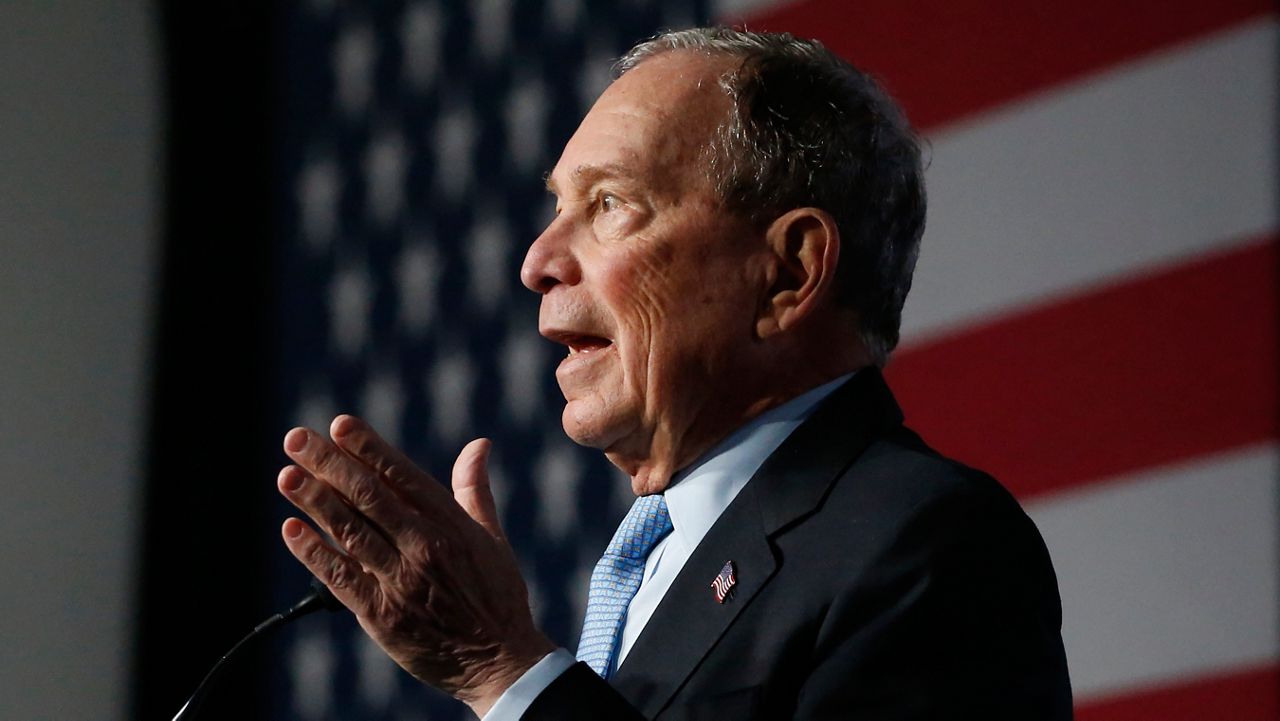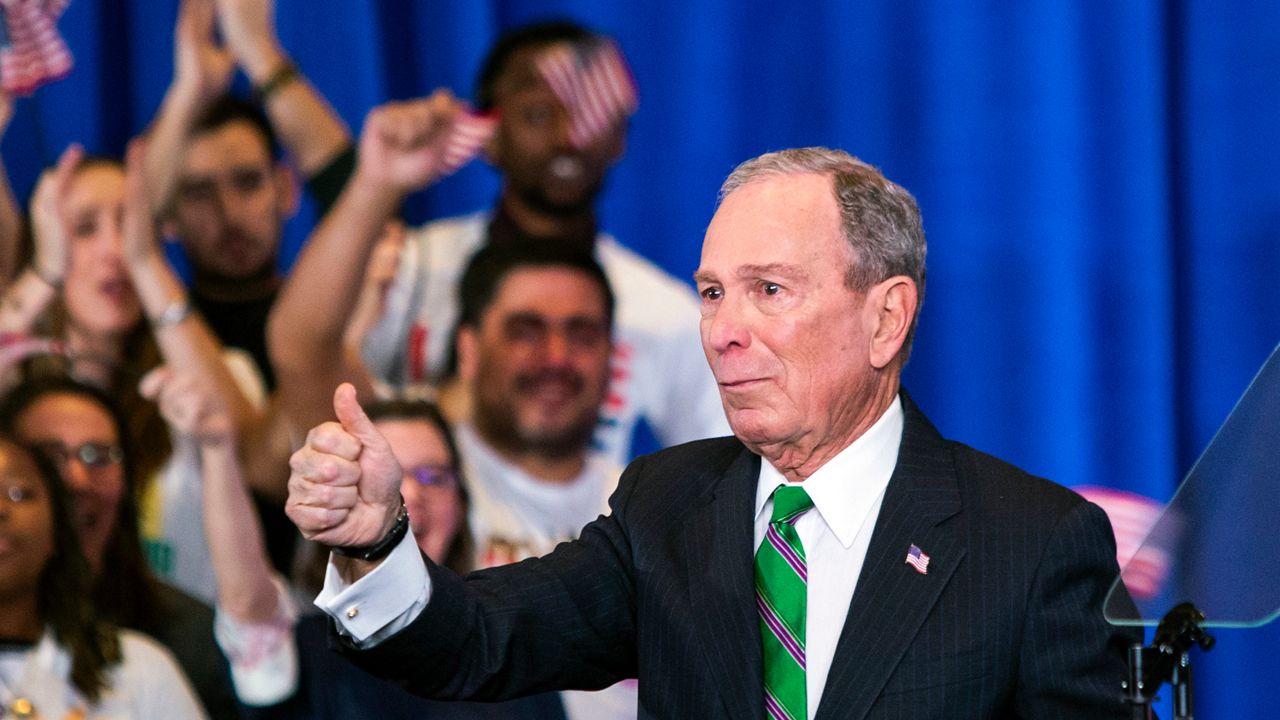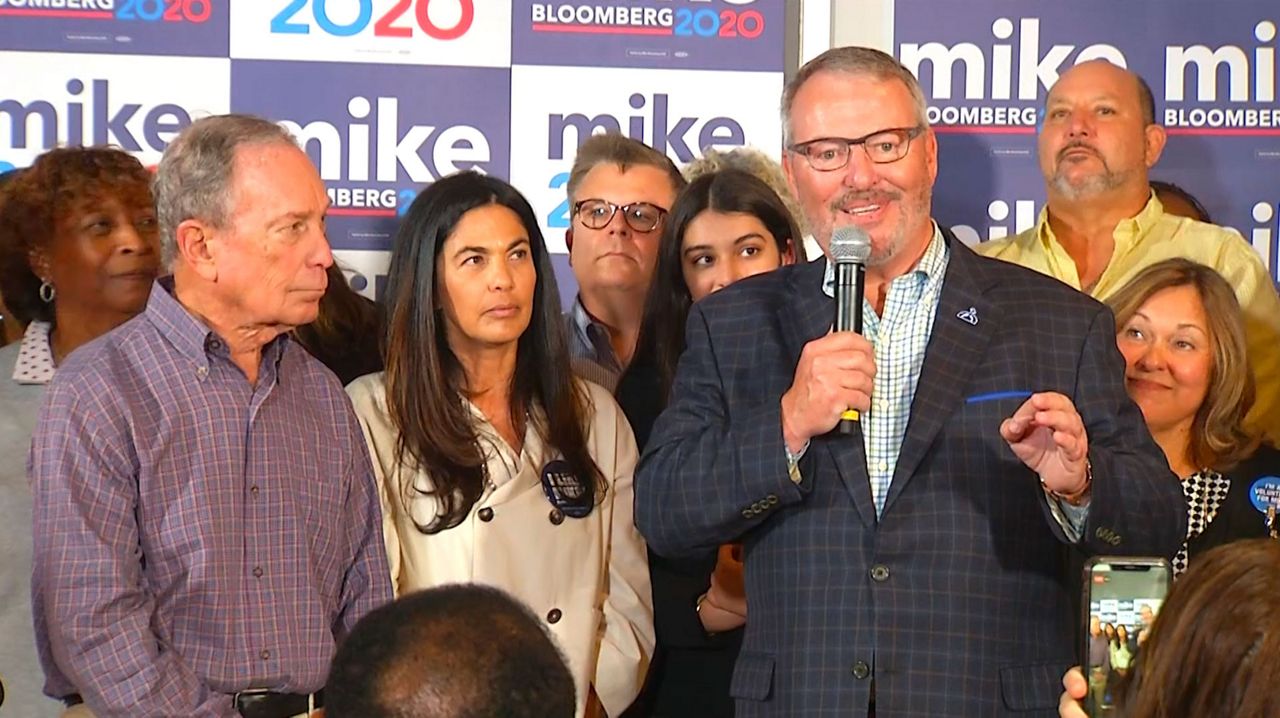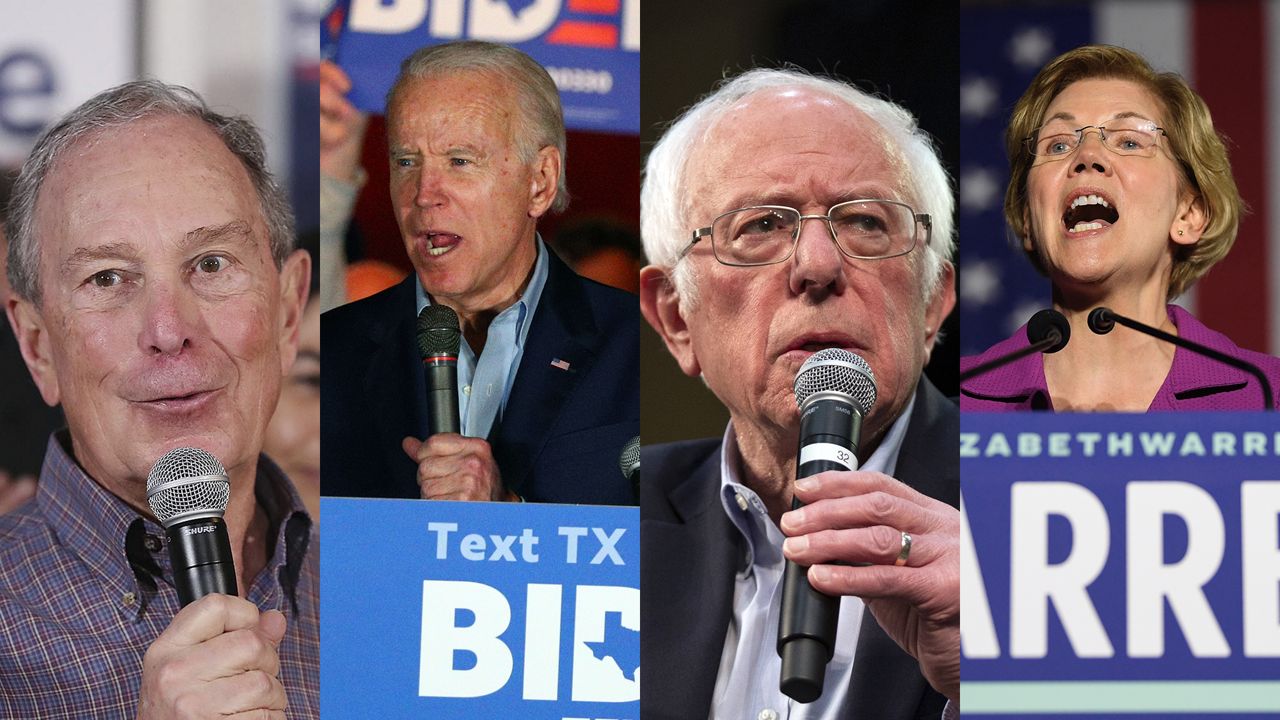Despite spending hundreds of millions of dollars on his Democratic bid for president, former New York City Mayor Michael Bloomberg had a night of setbacks on Super Tuesday, failing to win any states.
- LIVE ELECTION RESULTS: Take a look at the full results in the Super Tuesday races
- Soda Ban, Stop-and-Frisk, and a Third Term: Mike Bloomberg's Record as NYC Mayor
NO BIG RETURN FOR BIG SPENDING
Bloomberg was not projected to win any of the 14 states, though he was able to claim victory in American Samoa, a U.S. territory that awards six pledged delegates in the battle for the Democratic nomination.
As of 3:10 a.m., Bloomberg cleared the 15 percent threshold to earn some delegates in a handful of the Super Tuesday states:
- California (16.4 percent)
- Utah (16.9 percent)
- Colorado (21 percent)
- Tennessee (15.9 percent)
- Arkansas (16.7 percent)
He was on the verge of clearing the threshold in Texas, where he had 14.9 percent of the vote, with 91.5 percent of precincts reporting.
It's unclear how many delegates he'll receive, as results were still coming in as of this writing in multiple states.
SEEING THE SUNSHINE STATE SIDE OF THINGS
Bloomberg projected optimism in Election Night remarks delivered not from a Super Tuesday state but from Florida, which holds its primary March 17.
"No matter how many delegates we win tonight, we have done something no one else thought was possible," Bloomberg said in a speech to supporters Tuesday night. "In just three months, we've gone from just 1 percent in the polls to being a contender for the Democratic nomination for president."
The mayor focused his speech on President Donald Trump and the general election.
"While my fellow candidates spent a whole year focusing on the first four states, I was out campaigning against Donald Trump in the states where the election will actually be decided," Bloomberg said.

A BLOOMBERG EXIT?
Earlier in the day, the former mayor appeared testy when asked about his chances against former Vice President Joe Biden, and whether he would leave the race:
Bloomberg: Joe's taking votes away from me.
Reporter: But you're also taking votes away from Joe Biden.
"Well, it goes in both directions. Have you asked Joe whether he's going to drop out?" Bloomberg asked, adding, "When you ask him that, then you can call me."
Former Tampa Mayor Bob Buckhorn told NY1 that a reassessment could be imminent for the former mayor.
"There's an election next Tuesday," Buckhorn said. "There's an election two weeks from Tuesday, which is Florida. And so we're confident and optimistic that he's going to do well. But at the end of that process, if the math doesn't work, then Mike's going to have to make a decision. But we're going to fight until the bitter end."
According to the Associated Press, Bloomberg planned to take stock of his bid Wednesday after the disappointing Super Tuesday results. He has spent more than half-a-billion dollars on his campaign.
SKIPPING NOMINATING CONTESTS
Super Tuesday marked Bloomberg's first appearance on a presidential ballot. He actually skipped the first four Democratic nominating contests:
- Iowa caucuses (February 3)
- New Hampshire primary (February 11)
- Nevada caucuses (February 22)
- South Carolina primary (February 29)
The mayor, who entered the race in late November, had to swiftly make up ground to compete with candidates like Sanders, Biden, Warren, and others, who have spent months traveling the country meeting voters. His opponents had much of 2019 to build out extensive teams of staffers on the ground; and no candidate has ever won a modern primary after entering the race so late. According to FiveThirtyEight, since 1976, no eventual president nominee (excluding incumbent presidents) has ever launched their campaign with less than a year to go before the general election. Bloomberg was hoping to smash that streak.
UNDER PRESSURE FOR STOP-AND-FRISK, ALLEGATIONS OF MISTREATING WOMEN
Despite the unusual strategy, Bloomberg quickly rose in the polls, to about 15 percent in his latest average of national polls, according to FiveThirtyEight
As a result, he came into Super Tuesday under fire from his opponents. He and the Sanders campaign have been trading shots on social media, and Bloomberg was a frequent punching bag in the two debates he participated in before Tuesday. In a widely-panned debate debut in Las Vegas on February 19, every candidate on the stage attacked Bloomberg within the first 10 minutes, bringing up several controversial parts of his record, such as stop-and-frisk. Bloomberg's own campaign admitted it was a less-than-stellar performance, although the consensus was he performed better in Charleston, South Carolina, six days later.
But the debate was representative of the kind of heat Bloomberg has faced in the lead-up to Super Tuesday. Candidates and their surrogates have skewered the mayor for his past support of stop-and-frisk, and Warren in particular hammered the billionaire for his record on women. A resurfaced national focus on allegations of harassment at his company, and inappropriate comments some former female employees said Bloomberg levied, came into particularly sharp focus in the debates.
"None of them accused me of doing anything other than maybe they didn't like a joke I told," Bloomberg said.
Warren in the Las Vegas debate demanded the mayor promise to release former women employees at Bloomberg L.P. from non-disclosure agreements if they wanted out. Bloomberg initially rejected the demand but offered to release three women two days later.
A CONSTANT EYE ON TRUMP
More of a political centrist than his fellow Democratic candidates, Bloomberg has been positioning himself as the best hope for unseating Trump in the general election campaign, for which candidates historically have moved closer to the center. The strategy has been evident on the campaign trail, with Bloomberg pouring money into ads attacking the president's record and divisive rhetoric, including by buying a spot in Super Bowl LIV, and targeting states that Trump narrowly won in 2016, such as Arizona, Michigan, Pennsylvania, and Wisconsin.
And the anti-Trump rhetoric isn't isolated to ads; Bloomberg has frequently denounced the Republican at campaign rallies.
"He will say the state of our union is strong, but the truth — and we all know it — is our union is as divided as never before in our lifetimes," Bloomberg said at a rally in Philadelphia before the State of the Union. "We have an angry, out of control, lawless president dividing the American people and abusing his office."
As a result, Trump has frequently snapped at Bloomberg on Twitter:
BLOOMBERG VS. SANDERS
Heading into Super Tuesday, the Bloomberg camp set its eyes on Sanders, who is arguably the mayor's foil. Fighting between the camps had increased in recent weeks, with the Bloomberg team going to Twitter to slam the Vermont senator on his record on guns and spotlighting online harassment by so-called "Bernie Bros" — though Sanders has condemned such behavior.
Bloomberg surrogates have followed by attacking Sanders, including Queens Rep. Greg Meeks, who joined several mayors at a press conference before the Charleston debate.
"Does Bernie Sanders need to apologize to the grieving families who have sued gun makers but face hurdles in court due to Bernie Sanders's vote?" Meeks said. "Too often Bernie Sanders has been on the wrong side of history."
For his part, Sanders has continuously hit Bloomberg on his personal wealth.
"Democracy to me means one person, one vote, not Bloomberg or anybody else spending hundreds of millions of dollars trying to buy an election," the Vermont senator said at a rally in Denver.
UNPRECEDENTED LEVELS OF SPENDING
Bloomberg has not been ashamed of using that wealth to unseat Trump, though. Bloomberg's campaign is officially barely over three months old, but for a nationwide advertising blitz he has spent over $500 million — including more than $155 million in about the first five weeks of the campaign. As a result, Bloomberg has flooded the airwaves.
At the debates, Bloomberg argued his huge sums of spending not only helped elect Democrats take back the U.S. House of Representatives in 2018, but it will help unseat Trump no matter who the nominee is (the mayor has promised to dump more than $1 billion of his personal wealth to defeat the president).
A TWO-HORSE RACE?
Super Tuesday was the second-biggest election night of the year. Democrats were vying for their share of more than 1,300 pledged delegates — about a third of the total up for grabs in 2020 — across 14 states and a diverse electorate. A candidate needs 1,991, a majority, to secure the nomination.

The final delegate tally for the candidates wasn't confirmed as of this writing, but Biden and Sanders won all the states Bloomberg was vying for.
According to Associated Press projections, Biden won nine of the Super Tuesday states: Texas, Massachusetts, Minnesota, Tennessee, Arkansas, Alabama, Oklahoma, North Carolina, and Virginia.
Sanders took four: California, Vermont, Utah, and Colorado.
The race in Maine was too close to call as of 3:10 a.m. Wednesday. With 81.4 percent of precincts reporting, Biden led 33.9 percent (61,795 votes) to Sanders's 33.1 percent (60,450 ballots). Massachusetts Sen. Elizabeth Warren was in third (16 percent), while Bloomberg was behind her (11.9 percent).
-----
ADDITIONAL BLOOMBERG 2020 COVERAGE
Amid Questions About His Record on Women, Bloomberg Campaigns For Their Votes in Manhattan
Bloomberg Now Backs a $15 Minimum Wage — a Change in Stance
Bloomberg Is a Democrat With a History of Backing Republicans — Including In 2018
What Bloomberg Did — and Didn't Do — When It Came to Taxing Wealthier People
It's Clear Bloomberg's NYC Record is Following Him on the 2020 Campaign Trail
Mike Bloomberg Is Worth About $54B. Is That Actually a Weakness For a Democrat Now?
Bloomberg's Stop-and-Frisk Apology Is a Far Cry From His Defense When He Was Mayor
------
Looking for an easy way to learn about the issues affecting New York City?
Listen to our "Off Topic/On Politics" podcast: Apple Podcasts | Google Play | Spotify | iHeartRadio | Stitcher | RSS









